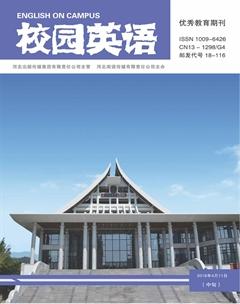Professor Xu Yuanchong and His Translation of Chinese Classics
Zhang Nan
【Abstract】Professor XuYuanchong is one of the most distinguished translator in modern times.He proposes “Three beauties” theories and has made great contribution translating Chinese literary classics into English. this paper aims to appreciate the beauty conveyed in Professor Xus translation.
【Key words】three beauty; Chinese classics; translation; poetry
Professor Xu is famous as a master who translated the Chinese classical works into English. He has made great contributions in the field of translation. It is estimated that Professor Xu has published more than 60 books, among which 4,namely,The Art of Translation, Literary Translation, Vanished Springs and Literary Translation Theories has contributed greatly to “the creation of a new school in Chinese translation theory”. He has translated many Chinese literary classics into English such as The Book of Poetry, The Songs of the South, Tang Poems,300, Song Lyrics, Selected Poems of Li Bai, and Selected Poems of Mao Zedong.
Of all the translation theories he proposes, “Three beauties”, which are “beauty in sense”, “beauty in sound” and “beauty in form”. These have been held in high esteem by translators and scholars. Professor Xus translation has well conveyed the original beauty of the poetry in sense, sound and form. The production of Chinese classics is a kind of art, which contains the beauty of artistic conception, temperament and form, especially the Chinese poetry and lyric. When the Chinese classic poetry is translated into English, the beauty of the poetry and lyric is not only required to be reserved, but also to be embodied.
Ru Meng Ling is one of the short lyric written by li Qingzhao in her early time and the authors love of nature and spring is fully reflected in this short lyric. Here is the translation of Professor Xu .
Tune “Like a Dream”
Last night the wind was strong and rain was fine,
Sound sleep did not dispel the taste of wine.
I ask the maid whos rolling up the screen.
“The same crab - apple tree, ”she says, “is seen. ”
“Dont you know,
Dont you know
The red should languish and the green must grow?”
Firstly, in the translation of the title, Mr. Xu translates it as Tune “Like a Dream”. This method of translation maintains a high agreement with the mood of the original lyric. It is more of charm than the single transliteration and more consistent with the style of the original. In the first sentence, Mr. Xu translate “雨疏”as “rain was fine”. Here Mr. Xus translation doesnt constrain itself in the original meaning but is of great artistic beauty. In the sentence Mr. Xu adapts “sound sleep” instead of “deep sleep” as the counterpart of “浓睡”, thus avoiding worldliness of literal translation word by word. In addition , the translated version of “残酒”as “the taste of wine”instead of “the effects of wine”is more of the flavor of poetry. In the fourth sentence, here “海棠”means the “the crab - apple tree”rather than “the crab – apple blossom”. So Mr. Xu has given us a very accurate translation. In the last sentence ,“应是绿肥红瘦” translated as“The red should languish and the green must grow” has found its punch line in the hands of Mr. Xu . The above analysis is the very proof of the beauty of artistic conception in Mr. Xu s translation of poems.
From the closer study of Mr. Xu s translation of this short lyric. It is not hard for us to find the measured rhythm, which manage to enable the reader to form a flowing sense about it Mr. Xu exchange the order of “雨疏”and “风骤”while translating“雨疏风骤”as “the wind was strong and rain was fine”so as to keep consistent with the sound rhyme of the second sentence. Thats to let the first sentence“the wind was strong and rain was fine”rhymes with the second sentence“Sound sleep did not dispel the taste of wine”. “卷帘人” was translated as “whos rolling up the screen”instead of “rolling up the curtains”. The aim of this translation is to let the word “screen” rhymes soundly with “The same crab - apple tree, ”she says, “is seen. ”of the fourth sentence. The repetition of “Dont you know”make a very rhyme with the last sentence“The red should languish and the green must grow”. So here in terms of rhyme, Mr. Xu s translation of this short lyric is also of great beauty of artistic temperament.
The translatorspursuit of the art of interpretation should be eternal. The well translated Chinese poetries or lyrics, which contains the beauty of artistic conception, temperament and form in harmony will not only make the English reader appreciate the unique charm and learn about the spiritual connotation of our ancient Chinese classics but can also impress the Chinese readers with the beauty and charm of the English language. The two different languages coordinate with each other and at the same time contrast finely with each other.

